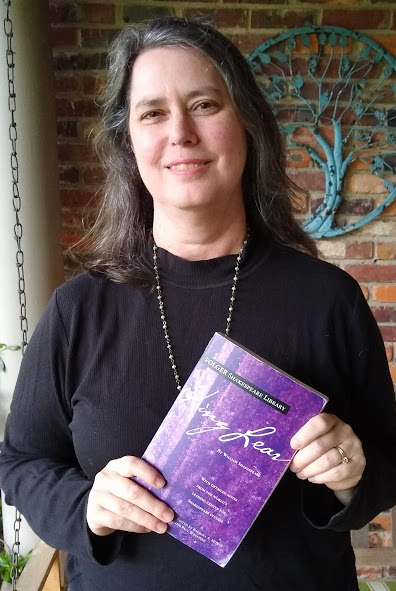MGA Professor: Why Shakespeare Still Matters
Author: News Bureau
Posted: Thursday, April 23, 2020 12:00 AM
Categories:
School of Arts and Letters | Pressroom
Macon, GA

Dr. Benita Muth holds a copy of Shakespeare's King Lear.
William Shakespeare, the renowned English poet and playwright, was born on April 23, 1564. On this, his 456th birthday, it's worth pondering: Does "the Bard" still matter? Is his work relevant today?
The answer, according to Middle Georgia State University Shakespeare scholar Dr. Benita Muth, is a resounding yes.
"Shakespeare’s plays live on, not just in classrooms, but on contemporary stages and in film," said Muth, professor of English and coordinator of MGA's graduate technical writing programs. "He remains the most-produced playwright, and his plays continue to inspire actors, directors, and audiences."
She goes on:
"The power of his characters and language still makes audiences laugh, gasp, cry, and consider the dilemmas of leadership, power, love, grief, and the human condition.
"In our current situation, we again find fellowship with Shakespeare, who also experienced pandemics and quarantines. Throughout his career, theaters were often closed to reduce the spread of plague. The plague struck London in 1593, the year before Shakespeare wrote Romeo and Juliet, and that play shows a quarantine preventing Friar Laurence’s letter from reaching Romeo. During another plague outbreak 1606, Shakespeare wrote three of his most enduring plays: King Lear, Macbeth, and Antony and Cleopatra. Take a look at James Shapiro’s book 1606: The Year of Lear to see how living through that year of crisis shaped Shakespeare’s experience.
"Although our theaters are now closed, several premiere theater groups such as the Globe, the Folger Theater, and the Stratford Shakespeare Festival have made recent Shakespeare productions available free on streaming platforms. Celebrate Shakespeare by watching an old favorite, revisiting one you studied, or – best yet – seeing one you haven’t yet experienced. Remember why people today agree with his contemporary Ben Jonson that Shakespeare is 'not of an age, but for all time!'"
